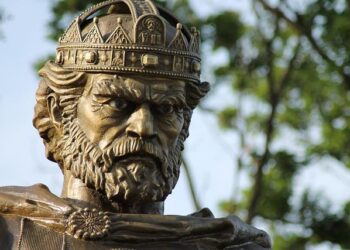Bulgaria has once again called on North Macedonia to fulfill its commitments as part of the ongoing European Union accession process, reaffirming its firm stance against any alterations to the established consensus between the two countries. The Bulgarian government emphasized the importance of adherence to previously agreed terms, underscoring that any attempts to modify the consensus framework would be unacceptable. This development marks a continuation of the diplomatic tensions surrounding North Macedonia’s EU bid, highlighting the complexities of regional cooperation in the Western Balkans.
Bulgaria Demands North Macedonia Uphold EU Accession Promises Amid Regional Tensions
Bulgaria has taken a firm stance regarding North Macedonia’s ongoing EU accession process, emphasizing the need for the neighboring country to fully comply with existing agreements. Sofia insists that there be no alterations to the previously established consensus before moving forward. This demand stems from concerns over historical and cultural disputes that have repeatedly hindered progress. Bulgarian officials stress that respecting commitments made during EU negotiations is crucial not only for bilateral relations but also for maintaining stability in the Balkans amid mounting regional tensions.
Key points outlined by Bulgaria include:
- Adherence to bilateral agreements signed with North Macedonia
- Ensuring the protection of cultural and historical heritage recognized by both countries
- Rejecting any unilateral attempts to revise the existing framework
A recent comparative overview of the EU accession status highlights the complex dynamics between member states and candidate countries:
| Country | EU Candidate Since | Current Status | Key Obstacles | |||||||||||||||||||||||||
|---|---|---|---|---|---|---|---|---|---|---|---|---|---|---|---|---|---|---|---|---|---|---|---|---|---|---|---|---|
| North Macedonia | 2005 | Negotiation talks frozen | Bilateral disputes with Bulgaria | |||||||||||||||||||||||||
| Albania | 2014 | Negotiations ongoing | Judicial reforms |
| Country | EU Candidate Since | Current Status | Key Obstacles | |||||||||||||||||||||||||
|---|---|---|---|---|---|---|---|---|---|---|---|---|---|---|---|---|---|---|---|---|---|---|---|---|---|---|---|---|
| North Macedonia | 2005 | Negotiation talks frozen | Bilateral disputes with Bulgaria | |||||||||||||||||||||||||
| Albania | Sofia Emphasizes Importance of Historical Consensus for Balkan Stability and Integration Bulgaria has reiterated its firm stance on the necessity of maintaining historical consensus as a foundation for political stability and regional cooperation in the Balkans. Officials in Sofia emphasize that historical narratives must be respected and mutually agreed upon, warning that any attempts to revise or undermine these agreements could jeopardize not only bilateral relations but also the broader European Union integration process for North Macedonia. The Bulgarian government urges North Macedonia to fully comply with previously established EU commitments, highlighting that this adherence is critical to fostering trust and ensuring a transparent accession pathway. Key points underscored by Bulgarian diplomats include:
Experts Recommend Renewed Dialogue Framework to Resolve Disputes and Advance EU Membership ProcessIn a recent development, leading EU experts and diplomatic figures have underscored the urgent need for a renewed and structured dialogue framework between Bulgaria and North Macedonia. This approach aims to resolve longstanding disputes that have hindered North Macedonia’s EU accession progress. Experts highlight that fostering transparent communication and mutual respect within this framework could pave the way for breaking the current deadlock, while preserving the integrity and consensus established by EU member states. The proposed dialogue mechanism emphasizes several core principles:
A summarized comparison of current positions is outlined below:
Building on these positions, experts recommend initiating the dialogue with a focus on confidence-building measures, prioritizing cultural exchanges and academic collaborations. Such steps could gradually bridge trust gaps and enable substantive negotiation on sensitive historical issues. Furthermore, setting definitive timelines under EU oversight would help maintain momentum, ensuring that progress on the bilateral front aligns seamlessly with North Macedonia’s broader EU integration path. If you want, I can also help draft a formal proposal outline or talking points for the dialogue framework. Just let me know! To ConcludeAs tensions persist between Bulgaria and North Macedonia over EU accession talks, Sofia remains steadfast in demanding full adherence to previously agreed commitments, rejecting any attempts to alter the existing consensus. The dispute underscores the complexities facing the European Union as it seeks to advance enlargement in the Western Balkans while balancing historical and political sensitivities. How these negotiations unfold will be closely watched, not only by the countries directly involved but also by EU member states invested in regional stability and integration. ADVERTISEMENT |
















